Are Men OK?

```html
The Unexpected Rise of Richard V. Reeves: Championing Men in a Post-Feminist World
A Surprising Advocate
Richard V. Reeves, president of the American Institute for Boys and Men (AIBM), found himself the lone man among prominent women at The Washington Post's 2024 Global Women's Summit. His book, "Of Boys and Men," targets a demographic he once wouldn't have imagined addressing: liberal mothers concerned about their sons.
Reeves, a self-described feminist, discovered troubling "side effects" of feminism's successes while researching economic inequality. These included a widening gender gap in college graduation rates, favoring women, and stagnating wages for men.
The Plight of Men
Reeves paints a bleak picture of contemporary American men: lower workforce participation rates, increasing rates of fatherlessness, and alarmingly high rates of "deaths of despair." His research revealed that men are significantly more likely than women to die from drug overdose, alcohol abuse, or suicide, with the suicide rate for men aged 25-34 rising sharply since 2010.
Despite initial discouragement from colleagues fearing backlash, Reeves persevered, driven by the pervasive, unspoken anxieties about the struggles of men and boys. His book, initially rejected by publishers, ultimately found a home with Brookings Institution Press and catapulted Reeves into the spotlight.
Navigating a Polarized Landscape
Reeves's work has drawn criticism. Some argue that his focus on men reinforces a zero-sum view of gender equality, potentially exacerbating existing tensions. Others question his reluctance to directly challenge the prevailing political and economic systems they believe contribute to widespread precarity.
"If men are struggling, it's because billionaires and big corporations... have forced us all to take care of ourselves without the kind of social safety net that other high-income countries take for granted," argues Jessica Calarco, a sociology professor.
A New Conversation
Reeves’s presence at events like the Women's Summit demonstrates his commitment to fostering open dialogue. His ability to engage with diverse audiences, even those initially skeptical, has earned him praise for his communication skills.
“Have you ever met someone who was so good at communicating?” remarked an attendee after Reeves's panel at the summit.
From Policy Wonk to Public Intellectual
Reeves's journey from a "proudly boring" policy analyst to a leading voice on masculinity is a testament to the resonance of his message. With endorsements from figures like Barack Obama and funding from Melinda French Gates, Reeves is building AIBM into a prominent platform advocating for boys and men.
“Democrats should be fighting for every constituency," says Democratic campaign leader Shauna Daly. "And this is one that we’ve really left on the table for a long time.”
The Future of Masculinity
Reeves's work seeks to create a "permission space" for a nuanced discussion about men's struggles, one that aligns with feminist principles and acknowledges the complexities of masculinity in a rapidly changing world.
His goal, he emphasizes, is a society where gender identity is less defining, not more, and where boys and men, like girls and women, have the tools and support they need to thrive.